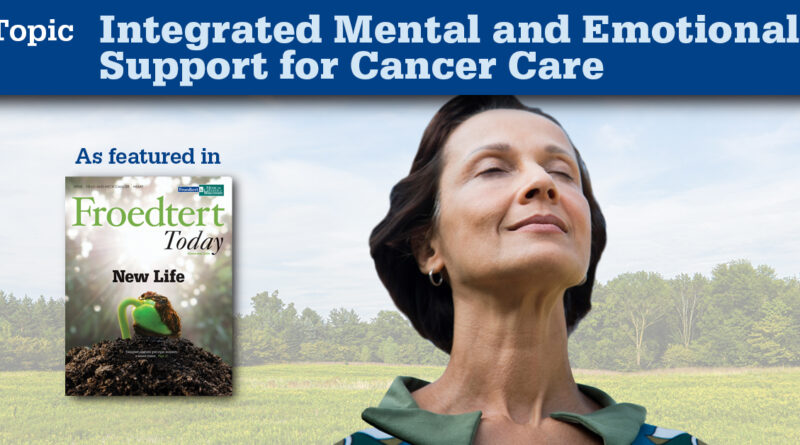Special Mental Health Team Supports People With Cancer | Froedtert and the Medical College of Wisconsin
Cancer challenges every part of us. Along with the physical demands of illness and treatment, patients can also experience many psychological and emotional challenges.
Traditionally, these issues have not been at the center of cancer care. But for patients receiving treatment through the Froedtert & the Medical College of Wisconsin Cancer Network, mental health services are an important part of treatment.
According to cancer experts Froedtert & MCW, the goal goes beyond reducing the emotional burden of cancer. There is strong evidence that effective mental health care is an important part of beating cancer and preventing it from coming back.
The Impact of Stress on Cancer
“Our knowledge of the biology of stress has exploded in recent years,” said Jennifer Knight, MD, MS, a psychiatrist and MCW faculty member. Dr. Knight is part of the Wisconsin Institute of NeuroScience (WINS).
“We now know that many physiological processes in the tumor microenvironment are adversely affected by chronic stress,” he said. In other words, chronic stress reduces the body’s ability to fight cancer.”
For example, many tumors develop a network of blood vessels. Medical treatments aim to prevent this growing network of blood vessels. But according to Dr. Knight, research has shown that stress increases the hormonal patterns that control the development of blood vessels.
“When you’re under a lot of stress, the tumor can have more blood vessels,” he said. “In fact, stress can increase the tumor’s ability to grow.”
Dr. Knight also noted that the body’s response to some types of cancer is to create a matrix of cells around the tumor, trying to “wall” it and prevent it from spreading.
He said: “However, we found that when there are increased levels of stress, the matrix breaks down. As a result, tumor cells are able to break off and spread. Stress reducing the body’s ability to prevent cancer from growing.”
Emotional Health as an Aspect of Cancer Care
Dr. Knight is director of the Psycho-Oncology Program within the Froedtert & MCW Cancer Network. The program includes a comprehensive team of psychiatrists, psychologists and mental health counselors who work specifically with people with cancer.
“As a team, we use an integrated approach that depends on the individual needs of the patient, and that can include medical and behavioral therapies,” Dr. Knight said. “Our goals are to improve the mental and emotional health of our patients, and thereby, improve their response to treatment.”
Cancer Network doctors and nurses weave psychological and emotional support into medical care from the beginning of the patient experience.
“For example, every patient who comes to our Breast Care Center fills out a stress questionnaire,” said Chandler Cortina, MD, MS, a surgical oncologist and MCW faculty member. “That helps us to know from the beginning – and objectively – what psychological and social support the patient may need.”
Patients who can benefit from counseling and medication are connected to the team of Dr. Knight. Cancer Network also offers many support services designed to reduce the stress of a cancer diagnosis and treatment.
“Our social workers help identify problems for people with cancer, such as transportation and child care,” said Dr. Cortina. For example, if someone is going to have radiation treatment every day of the week for three weeks, who will pick up their children from school and how will they be looked after?
According to Dr. In Cortina, mental health also plays an important role in survival.
After a cancer patient goes through treatment, there is often a feeling of ‘What if?’ inside their minds,” he said. “What would happen if the cancer came back? What are my options?
For some people, this backstory is weak. But for some, the “what if” thoughts are always heavy and overwhelming.
“Our mental health team can help these patients get out of that mindset and focus on ‘I’m alive, I don’t have cancer’ and other positive ways of thinking,” Dr. Cortina said. “Reducing stress in this way can play an important role in reducing the risk of cancer recurrence.”
Health is the ultimate goal
In addition to its large team of mental health and social support professionals, Cancer Network offers support groups for patients with the disease. Services are also available for family members who accompany and care for patients.
Dr. Cortina believes that mental and emotional health is key to achieving the ultimate goal of treatment for cancer patients.
“We don’t just want patients to get through their treatment and live, we want them to feel good and enjoy their lives,” he said. “Helping patients feel healthy not only physically, but also emotionally and mentally, is key to making sure our patients are healthy.”
#Special #Mental #Health #Team #Supports #People #Cancer #Froedtert #Medical #College #Wisconsin

